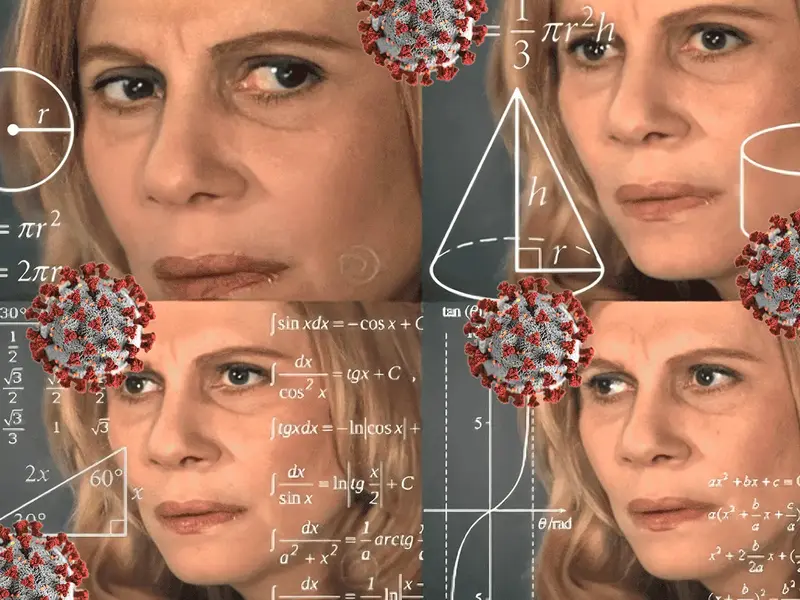Brain
Why It’s So Hard to Make Risk Decisions in the Pandemic
Our brains weren’t built to do public health calculus like this, but following a few pieces of advice from the experts will help as you weigh your options
This High Schooler Invented a Low-Cost, Mind-Controlled Prosthetic Arm
Seventeen-year-old Benjamin Choi put his spare time during the pandemic to good use designing an accessible device that doesn't require brain surgery
Negative Effects of Social Media May Impact Adolescent Girls and Boys at Different Ages
A new study suggests certain 'windows' of development when youngsters appear most sensitive to technology
Brain Implants Allow Paralyzed Man to Communicate Using His Thoughts
This study marks the first time a completely paralyzed patient regained the ability to communicate at length, researchers say
Sleeping With Even a Dim Light Can Raise Blood Sugar and Heart Rate
In a study of 20 participants, those that slept with a light had worse blood sugar control the next morning compared to those who snoozed in total darkness
Even Mild Covid-19 Infections May Change the Brain, New Study Finds
Scans taken before and after a case of coronavirus reveal tissue damage and accelerated loss of gray matter
Brain Scans of Dying Man Suggest Life Flashes Before Our Eyes Upon Death
An elderly epilepsy patient unexpectedly died during a brain scan, revealing bursts of activity associated with memory recall, meditation, and dreaming
Some Neurons in Your Brain Respond to Singing but Not Other Music
Researchers tested 15 participants’ responses to 165 different noises, including toilet flushing, road traffic, instrumental music, speaking and singing
Long-Term Space Travel May 'Rewire' Astronauts' Brains
The changes may help the organ adapt to microgravity, but they seem to persist for several months after returning to Earth
New Tools May Help Diagnose Fetal Alcohol Spectrum Disorders
If conditions stemming from exposure to alcohol in-utero can be better identified, then scientists can more effectively research treatments
How Exercise Boosts the Brain and Improves Mental Health
New research is revealing how physical activity can reduce and even ward off depression, anxiety and other psychological ailments
Your Pet Cat Has a Smaller Brain Than Its Wild Ancestors
The researchers replicated experiments done in the '60s and '70s with updated knowledge of feline lineage
Chimpanzees Appear to Use Insects to Treat Their Wounds
In a first, chimps in Gabon were seen applying insects to sores on themselves—and others, a possible show of empathy
Fifty Years Ago, the First CT Scan Let Doctors See Inside a Living Skull
The invention came from an eccentric British engineer who worked at a company now better known for selling Beatles albums
This Molecule Could Be the Key to Understanding Why Concussions Have Such Long-Term Effects
Neuroscientists identified the molecule that persists in the brain—and showed how to disarm it in mice
9/11 Changed How Doctors Treat PTSD
New research in the 20 years since the September 11th attacks has led to better therapies for those diagnosed with trauma disorders
A Marine Bacteria Species Shows Promise for Curing an Aggressive Brain Cancer
A new glioblastoma drug is derived from a microbe found in the ocean at depths of up to 6,500 feet
More Than 80 Cultures Still Speak in Whistles
Dozens of traditional cultures use a whistled form of their native language for long-distance communication. You could, too.
Unlike Humans, Cuttlefish Have Sharp Memories Even in Old Age
The cephalopods remember when, where and what they ate until days before death
Mini Brains Grown From Stem Cells Developed Light-Sensitive, Eye-Like Features
Understanding how eyes develop can help researchers pinpoint how to treat early retinal diseases
Page 6 of 21

:focal(1872x1497:1873x1498)/https://tf-cmsv2-smithsonianmag-media.s3.amazonaws.com/filer_public/c4/14/c414ac3e-e222-4161-84f2-d84ed7b74635/choibenjaminprojectphoto.jpg)
:focal(2880x1920:2881x1921)/https://tf-cmsv2-smithsonianmag-media.s3.amazonaws.com/filer_public/f5/ed/f5edb95a-34b9-4136-9cdb-db679b092ac6/gettyimages-1213627011.jpg)
:focal(400x225:401x226)/https://tf-cmsv2-smithsonianmag-media.s3.amazonaws.com/filer_public/fb/97/fb97eac7-9919-4c48-8f5d-04603817bb4c/2006_wc_1979.jpg)
:focal(2561x1708:2562x1709)/https://tf-cmsv2-smithsonianmag-media.s3.amazonaws.com/filer_public/8e/8f/8e8f1f17-9519-4974-ae05-bf19fe50533b/gettyimages-672152627.jpg)
:focal(2953x1870:2954x1871)/https://tf-cmsv2-smithsonianmag-media.s3.amazonaws.com/filer_public/bc/49/bc495b8e-9b09-41ac-9539-418eb08f65b1/gettyimages-104509055.jpg)
:focal(2658x1810:2659x1811)/https://tf-cmsv2-smithsonianmag-media.s3.amazonaws.com/filer_public/64/0c/640c6ffb-8e94-49a1-b4bb-456811766639/image_from_ios.jpg)
:focal(2800x1867:2801x1868)/https://tf-cmsv2-smithsonianmag-media.s3.amazonaws.com/filer_public/f3/a1/f3a169bc-8cb0-4104-80d3-258925796d55/gettyimages-1331498087.jpg)
:focal(960x960:961x961)/https://tf-cmsv2-smithsonianmag-media.s3.amazonaws.com/filer_public/5a/e8/5ae8e0c3-dbdc-40c2-92be-470ce1e2306e/1920px-bruce_mccandless_ii_during_eva_in_1984.jpg)
:focal(1061x707:1062x708)/https://tf-cmsv2-smithsonianmag-media.s3.amazonaws.com/filer_public/1e/18/1e1879eb-ebd6-4bfa-bd2d-607c4c992cd5/gettyimages-1216600045.jpg)
:focal(800x602:801x603)/https://tf-cmsv2-smithsonianmag-media.s3.amazonaws.com/filer_public/1f/9a/1f9acb47-7f4e-499a-854c-1a93e355130f/gettyimages-861458264_web.jpg)
:focal(1280x597:1281x598)/https://tf-cmsv2-smithsonianmag-media.s3.amazonaws.com/filer_public/10/ba/10ba50b7-a1c6-4ff2-97c2-a5daf3128660/resized_20200925_121939_1.jpeg)
:focal(2128x1419:2129x1420)/https://tf-cmsv2-smithsonianmag-media.s3.amazonaws.com/filer_public/e4/62/e4620082-2b98-402d-ba47-fb9b61eba8df/gettyimages-625850102.jpg)
:focal(741x88:742x89)/https://tf-cmsv2-smithsonianmag-media.s3.amazonaws.com/filer_public/33/1a/331a2367-0640-42b6-ade3-947ce4ac5933/godfrey_hounsfield.jpeg)
:focal(800x602:801x603)/https://tf-cmsv2-smithsonianmag-media.s3.amazonaws.com/filer_public/6e/50/6e50e314-b6d1-4cee-b8d2-1db9b0650d9d/gettyimages-460878540_web.jpg)
/https://tf-cmsv2-smithsonianmag-media.s3.amazonaws.com/filer/2f/f5/2ff5f68a-ad23-4ee5-80cb-1fb5a393f36f/gettyimages-1161266.jpg)
/https://tf-cmsv2-smithsonianmag-media.s3.amazonaws.com/filer/84/11/8411397a-8bfc-4f51-992d-c1f0dde78294/na124_jlf_2952.jpg)
:focal(670x525:671x526)/https://tf-cmsv2-smithsonianmag-media.s3.amazonaws.com/filer/a3/17/a31738aa-3394-4f35-b77c-cf537f6fb17c/gettyimages-579860044_web.jpg)
:focal(2571x1802:2572x1803)/https://tf-cmsv2-smithsonianmag-media.s3.amazonaws.com/filer/fd/e3/fde32640-68c7-4e70-9850-61cd786299fb/33584960595_62d7091baf_o.jpg)
:focal(153x309:154x310)/https://tf-cmsv2-smithsonianmag-media.s3.amazonaws.com/filer/19/a4/19a45954-e4b5-400c-b148-52f493ec5688/low-res_this_image_shows_a_brain_organoid_with_optic_cups_credit_elke_gabriel_2021_1jpg.png)